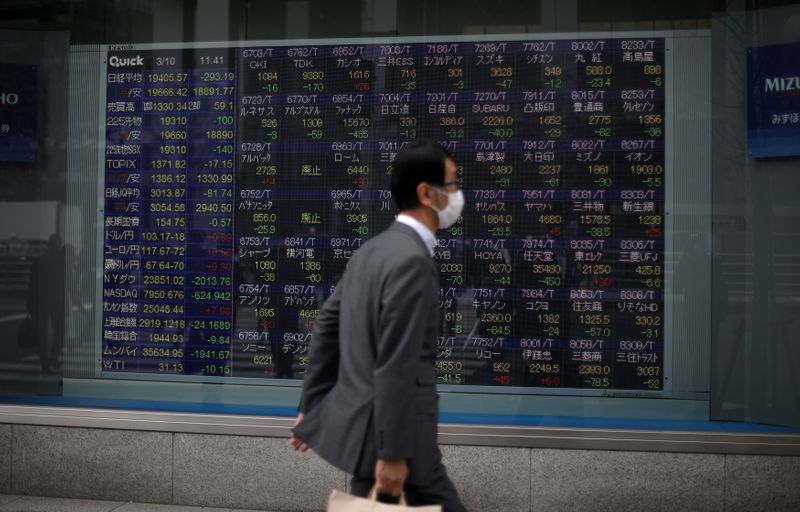By Stanley White and Koh Gui Qing
TOKYO/NEW YORK (Reuters) - Asian shares erased gains and the yuan languished on Thursday on growing worries China's planned security law for Hong Kong would spark a broader diplomatic confrontation with the United States.
MSCI's broadest index of Asia-Pacific shares outside Japan fell 0.35%, having been in positive territory earlier in the day. Shares in Hong Kong skidded 1.75%. Stocks in China fell 0.55%.
U.S. stock futures pared earlier gains to trade 0.17% higher.
Not all markets fell with investors in some countries keeping their focus on prospects of a post-coronavirus economic recovery.
Japan and Australia were both higher while European stock futures also defied the gloom with the pan-region Euro Stoxx 50 futures up 1.22%, German DAX futures rising 1.3% and FTSE futures climbing 1.34%.
All the same, the outlook remains fraught. The biggest risk to equities is the Sino-U.S. relationship, which is likely to worsen after U.S. Secretary of State Mike Pompeo said Hong Kong no longer warranted special treatment under U.S. law.
"All eyes remain on the U.S.-China relationship," said Chris Weston, the head of research at Pepperstone, a currency broker. "This is a risk for markets...one questions if the equity markets are too complacent here."
The proposal for new legislation is expected to be passed on Thursday by the National People's Congress.
Hong Kong shares erased early gains and fell as worries about U.S retaliation took hold.
Pompeo said overnight that China had undermined Hong Kong's autonomy so fundamentally that the territory no longer warranted special treatment, a potentially big blow to the city's status as a financial hub.
A punitive U.S. response to China on the issue of Hong Kong could result in a tit-for-tat reaction from Beijing, further straining ties between the world's two biggest economies and further hobbling global growth.
Sources have said the U.S. government may suspend Hong Kong's preferential tariff rates for exports to the United States, a far less severe response than formally revoking Hong Kong's special status under U.S. law.
President Donald Trump said he will announce a response to China's policies towards Hong Kong later this week.
Some share markets chose instead to focus on signs of recovery from the coronavirus pandemic.
Australian shares rose to the highest in more than two months after the country's central bank governor bolstered hopes for a quick economic rebound.
Japan's Nikkei stock index rose to the highest since late February as investors cheered the re-opening of economic activity after a fall in coronavirus infections.
The S&P 500 closed above 3,000 for the first time in almost 12 weeks on Wednesday, bolstered by bank stocks, as investors hoped that the world economy can recover as it re-opens.
Yields on 10-year U.S. Treasuries rose slightly to 0.6966%. Although 10-year yields are up from an all-time low of 0.4980% struck in March, they are still a whopping 120 basis points below highs seen in January.
U.S. crude futures fell 3.2% to $31.76 a barrel, while Brent crude fell 1.73% to $34.14 per barrel as investors fretted about Trump's response to China.
The offshore yuan was mired near a record low of 7.1966 per dollar due to uncertainty over Hong Kong's future. In onshore trade, the yuan was near its weakest since September last year, which was during the height of the U.S.-China trade war.
The euro made a fresh eight-week high of $1.1035, bolstered by a 750 billion euro plan to prop up the European Union's virus-hit economies. But it retreated as doubts about delivering the scheme crept in and last sat at $1.1015.

Spot gold rose 0.44% to $1,716.41 per ounce as some investors opted for the safety of the precious metal.